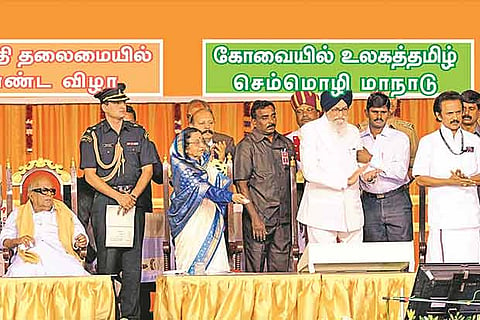

Chennai
If Tamil (and Tamilians) had triumphed first against the Lal Bahadur Shashtri (he assured that English would continue as the official language)-led Government of India in February 1965, it won the war against Indira Gandhi late in December 1967 by getting her to assure bilingual policy.
Remarkably, the cold (language) war did not stop there. Instead, it changed form. From opposing imposition of Hindi, Tamils and their political masters took to celebrating Tamil like never before.
So much so that one of the very first things the Chief Minister of then Madras State, C N Annadurai, an ardent Periyar follower, did was move a resolution in the State Assembly in July 1967 (five months after assuming office), to rename the state as Tamil Nadu (January 1969).
Thereon, opposing Hindi (also Sanskrit) and celebrating Tamil became an inevitable practice of whichever party was in power in Tamil Nadu. Arignar Anna, the political mentor of most modern day regional leaders, had introduced the culture by organising the second World Tamil Conference at Chennai in 1968. Awarding and honouring Tamil scholars and celebrating Tamil works became a duty of the state and its Dravidian political masters.
His pupil and matinee idol-turned Chief Minister MG Ramachandran had followed suit and organised the fifth edition of World Tamil Conference in 1981 in Madurai. Nearly half a decade later, late Chief Minister J Jayalalithaa had also got her name etched in Tamil history by organising the eighth World Tamil Conference in Thanjavur in 1995.
Tamil-champion and five-time Chief Minister M Karunanidhi, who had vainly tried everything at his disposal to organise a World Tamil Conference, successfully organised the Classical Tamil Conference in Coimbatore in 2010. Notably, the leaders’ Tamil symbolism and glorification were unending.
From naming buildings after language martyrs, to erecting statues for Tamil scholars, Tamil Nadu under the Kazhagams was on a celebration spree. While Karunanidhi had named CMDA building after language champions Thaalamuthu and Natarajan and erected 133ft statue for poet Thiruvalluvar in Kanniyakumari, Jayalalithaa announced a statue for Tamil Annai (mother) at Madurai.
Even their politics was not devoid of Tamil adoration. From 1967 to this date, hardly a poll manifesto of the DMK and AIADMK had gone without declaring Tamil as an official language of the country (and the Madras High Court) their poll demand. Life came a full circle on January 14, 2018, for Hindi-proponents even within Tamil Nadu when Prime Minister Narendra Modi had tweeted, Tamil makkalu kku iniya Pongal nalvaalthukkal (Happy Pongal greetings to Tamil people) on Pongal eve.
Be it Rahul Gandhi or Modi, their rallies in the state never began without a “vanakkam”, clearly riding piggyback on one of the Dravidian majors.
Nonetheless, the torch-bearers of Tamil pride who had succeeded in securing the two-language policy even during the good old days of north versus south, have thus far failed to get Tamil recognised as one of the official languages of the country, constitutionally.
While they don’t forget to honour the language martyrs every year, the regional parties have fallen way short of persuading the netas in New Delhi to give the stamp of approval making semmozhi Tamil mandatory in central establishments in the state.
The most recent opposition of all state parties, except BJP and Congress, to Navodhaya schools in Tamil Nadu should be testament to the currency of a near century-old language war.
That Kanchi seer Vijayendra Saraswati sat during invocation of the Tamil Anthem had stoked a political controversy between regional parties and the BJP is a telling commentary of the political significance of language pride in Tamil Nadu.
KAP VISWANATHAM
The tall Viswanatham, otherwise called Muthamizh Kavalar, was a regular feature of every anti-Hindi agitation protest in 1938. After Periyar and Annadurai were arrested, he delivered moving speeches and mobilised the people to fight for the dear cause, adding further momentum to the protest.
SI PA ADITANAR
Aditanar, who founded the Naam Thamilar Katchi with the objective of forming a sovereign Tamil state comprising Tamil Nadu and Tamil Eelam, played a key role in taking the struggle to the people through his Daily Thanthi . Aditanar, a fervent votary of the Tamil cause, was confined to solitary imprisonment in Coimbatore for his role in the historical protest.
Visit news.dtnext.in to explore our interactive epaper!
Download the DT Next app for more exciting features!
Click here for iOS
Click here for Android